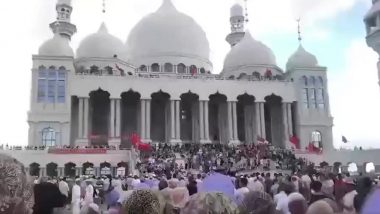Thousands of members of China's Hui Muslim minority are protesting in front of a mosque in Weizhou, in northwestern China, in a bid to prevent local authorities from demolishing the religious structure.
The Grand Mosque in Weizhou was completed just last year but authorities say it must be demolished as it lacks the proper building permits. Protesters say the mosque was under construction for over two years --- but no authority came down on it.
The drive to demolish the structure is being seen as Beijing’s move to clamp down on religious minorities in the country --- be it Christians or Muslims.
The new mosque in Weizhou has "soaring minarets and domes," in a Middle Eastern architectural style. The BBC reports most Hui mosques in the past "had been built in a more Chinese style." "Talks between mosque representatives and officials have failed to reach any agreement, as worshippers rejected a government plan to spare the mosque if its domes were replaced with pagodas more in keeping with Chinese style, one source in the area told Reuters."
Breaking: A lot of Hui Muslims flood into the square of Weizhou mosque for protest against China government violence demolition this pretty building!
SOS!!!#反清真运动https://t.co/RkLNcYtN0Y pic.twitter.com/HAfZoy5D3p
— 真回安然 ☪ (@ismaelan) August 9, 2018
Hui Muslims are from China’s north-west province of Ningxia. The province officially known as the Ningxia Hui Autonomous Region (NHAR), is an autonomous region of China. They have reportedly well-integrated into mainstream Chinese society as opposed to the Uighurs from Xinjiang.
However, attacks linked to radical Islamists have led the Chinese government to crack down on religious minority communities. A report tabled in the United Nations today estimates that up to 1 million Uighurs have been detained in Chinese indoctrination camps where they are forced to denounce Islam and profess loyalty to the atheistic Communist party.
In May this year, the Chinese government through the country’s top Islamic regulatory body had ordered all Chinese mosques to raise the national flag to “promote a spirit of patriotism” among Muslims. Flags were to be hung in a “prominent position” in all mosque courtyards, as instructed by the China Islamic Association.
This year also saw China issue a newly revised Regulations on Religious Affairs, which came into effect in February. The new regulations intensified punishments for unsanctioned religious activities and increased state supervision of religion in a bid to “block extremism” and tackle what Beijing sees as internal threats.
(The above story first appeared on LatestLY on Aug 11, 2018 06:02 AM IST. For more news and updates on politics, world, sports, entertainment and lifestyle, log on to our website latestly.com).













 Quickly
Quickly


